
Lester Alvin Burnett, better known as Smiley Burnette, was an American country music performer and a comedic actor in Western films and on radio and TV, playing sidekick to Gene Autry, Roy Rogers, and other B-movie cowboys. He was also a prolific singer-songwriter who is reported to have played proficiently over 100 musical instruments, sometimes more than one simultaneously. His career, beginning in 1934, spanned four decades, including a regular role on CBS-TV's Petticoat Junction in the 1960s.

Jasper Joseph Inman Kane was an American film director, film producer, film editor and screenwriter. He is best known for his extensive directorship and focus on Western films.

In Old Santa Fe is a 1934 American Western film directed by David Howard, starring Ken Maynard, George "Gabby" Hayes and Evalyn Knapp and featuring the first screen appearance of Gene Autry, singing a bluegrass rendition of "Wyoming Waltz" accompanied by his own acoustic guitar with Smiley Burnette on accordion. Autry and Burnette were uncredited, but the scene served as a screen test for the duo for subsequent singing cowboy films, beginning with The Phantom Empire (1935), in which Autry had his first leading role.
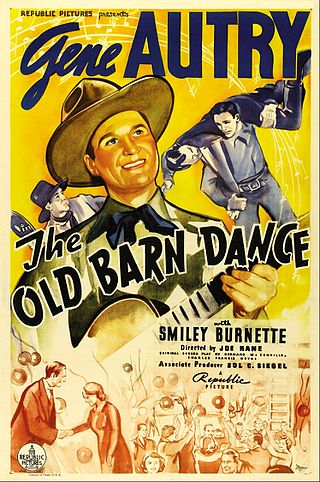
The Old Barn Dance is a 1938 American Western film directed by Joseph Kane and starring Gene Autry, Smiley Burnette, Joan Valerie, and written by Bernard McConville and Charles F. Royal.

The Old Corral is a 1936 American Western film directed by Joseph Kane and starring Gene Autry, Smiley Burnette, and Irene Manning. Based on a story by Bernard McConville, the film is about a sheriff of a small western town who sings his way into a relationship with a singer from a Chicago nightclub who earlier witnessed a murder. The supporting cast features Lon Chaney Jr. and Roy Rogers.

The Big Show is a 1936 American Western musical film directed by Mack V. Wright and starring Gene Autry, Kay Hughes, and Smiley Burnette. Written by Dorrell and Stuart E. McGowan, the film is about a singing cowboy who confuses two girls by being himself and his own stunt double at the Texas Centennial in Dallas. Roy Rogers appears in the film as one of the Sons of the Pioneers.

Public Cowboy No. 1 is a 1937 American Western film directed by Joseph Kane and starring Gene Autry, Smiley Burnette, and Ann Rutherford. Based on a story by Bernard McConville, the film is about a singing cowboy who chases down rustlers who are using airplanes, shortwave radios, and refrigerated trucks to steal cattle.

Man from Music Mountain is a 1938 American Western film directed by Joseph Kane and starring Gene Autry, Smiley Burnette, and Carol Hughes. Written by Betty Burbridge and Luci Ward, based on a story by Bernard McConville.
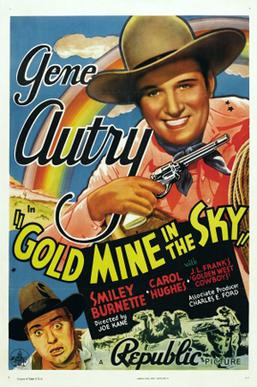
Gold Mine in the Sky is a 1938 Western film directed by Joseph Kane and starring Gene Autry, Smiley Burnette, and Carol Hughes. Based on a story by Betty Burbridge, the film is about a singing cowboy and ranch foreman who, as executor of the owner's will, must see that the daughter and heiress does not marry without his approval.
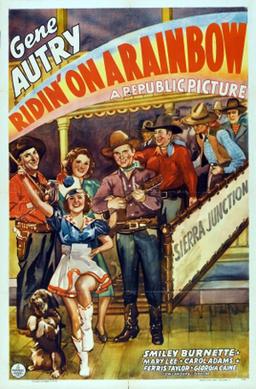
Ridin' on a Rainbow is a 1941 American western musical film directed by Lew Landers and starring Gene Autry, Smiley Burnette and Mary Lee. Written by Bradford Ropes and Doris Malloy, based on a story by Ropes, the film is about a singing cowboy whose investigation of a bank robbery takes him to a showboat, where he finds that a teenage singer's father has been working with the robbers to provide for her future. The film received an Academy Award nomination for best original song for "Be Honest with Me".

Melody Trail is a 1935 American Western film directed by Joseph Kane and starring Gene Autry, Ann Rutherford, and Smiley Burnette. Written by Sherman L. Lowe and Betty Burbridge, the film is about a singing cowboy who goes after the men who kidnapped the baby he should have been babysitting. The film features the songs "On the Melody Trail", "A Lone Cowboy on the Lone Prairie", and "Western Lullaby".

The Singing Cowboy is a 1936 American Western film directed by Mack V. Wright and starring Gene Autry, Smiley Burnette, Lois Wilde and Lon Chaney Jr. Based on a story by Tom Gibson, the film is about a cowboy who decides to sing on television in order to raise money for the orphaned daughter of his former boss who was murdered.
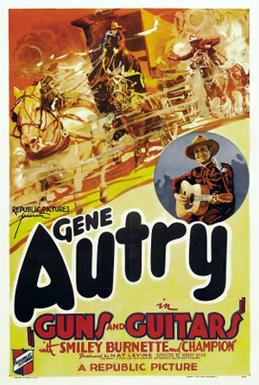
Guns and Guitars is a 1936 American Western film directed by Joseph Kane and starring Gene Autry, Smiley Burnette, and Dorothy Dix in her final film appearance. Written by Dorrell and Stuart E. McGowan, the film is about a singing cowboy who helps protect a county from fever-ridden cattle, and after being framed for murdering the sheriff, proves his innocence, gets elected sheriff, and then goes after the bad guy.
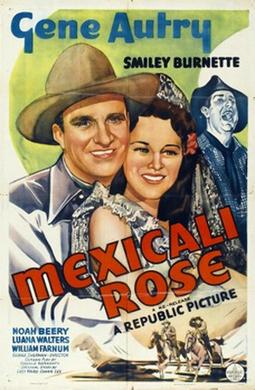
Mexicali Rose is a 1939 American Western film directed by George Sherman and starring Gene Autry, Smiley Burnette, and Noah Beery. Based on a story by Luci Ward and Connie Lee, the film is about a singing cowboy who fights corrupt oil men selling worthless stock from a non-existent well located on land belonging to a poor Mexican orphanage.

Colorado Sunset is a 1939 American Western film directed by George Sherman and starring Gene Autry, Smiley Burnette, and June Storey. Written by Betty Burbridge and Stanley Roberts, based on a story by Luci Ward and Jack Natteford, the film is about a singing cowboy and his buddies who discover that the ranch they bought is really a dairy farm—and worse, it's subject to intimidation from a protection racket that prevents dairy products from safely reaching the market.
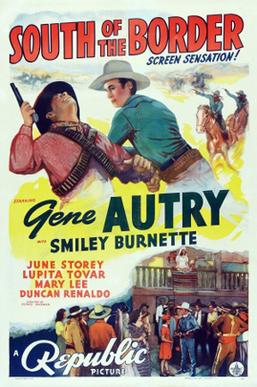
South of the Border is a 1939 Western film directed by George Sherman and starring Gene Autry, Smiley Burnette, and June Storey. Written by Betty Burbridge and Gerald Geraghty, based on a story by Dorrell and Stuart E. McGowan, the film is about a federal agent who is sent to Mexico to prevent foreign powers from gaining control of Mexican oil refineries and fomenting revolution among the Mexican people.
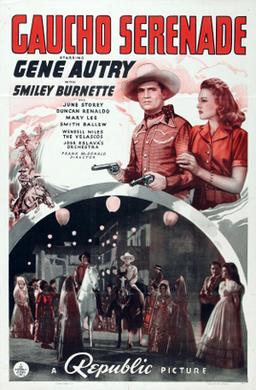
Gaucho Serenade is a 1940 American Western film directed by Frank McDonald and starring Gene Autry, Smiley Burnette, and June Storey. Written by Betty Burbridge and Bradford Ropes, the film is about a singing cowboy who goes up against a group of businessmen who plot to kidnap the son of a former partner so he won't testify against them.
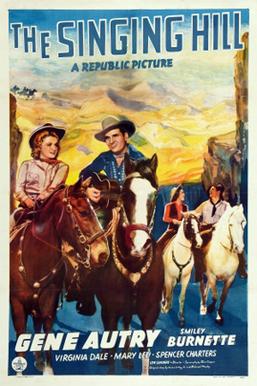
The Singing Hill is a 1941 American western film directed by Lew Landers and starring Gene Autry, Smiley Burnette, and Virginia Dale. Based on a story by Jesse Lasky Jr. and Richard Murphy, the film is about a singing cowboy and foreman of a ranch that may be sold to an unscrupulous banker by the young madcap heiress who is unaware that the sale will result in the local ranchers losing their free grazing land and their ranches. In the film, Autry performed the 1940 song "Blueberry Hill", first recorded by Sammy Kaye, which would become a standard recorded by such artists as Louis Armstrong (1949), Fats Domino (1956), and Elvis Presley (1957). The song became one of Autry's best-selling recordings. In 1987, "Blueberry Hill" received an ASCAP Award for Most Performed Feature Film Standards on TV.

Home in Wyomin' is a 1942 American Western film directed by William Morgan and starring Gene Autry, Smiley Burnette, and Fay McKenzie. Based on a story by Stuart Palmer, the film is about a singing cowboy who helps out a former employer in trouble with his failing rodeo while romancing a woman reporter. In Home in Wyomin', Autry sang his hit songs "Be Honest with Me", "Back in the Saddle Again", and "Tweedle O'Twill", as well as Irving Berlin's "Any Bonds Today", becoming the first major star to sing the official song of the U.S. Defense Bond campaign during the war.
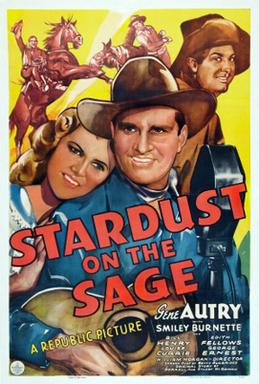
Stardust on the Sage is a 1942 American Western film directed by William Morgan and starring Gene Autry, Smiley Burnette, William Henry, and Edith Fellows. Written by Betty Burbridge, based on a story by Dorrell and Stuart E. McGowan, the film is about a singing cowboy who helps his fellow ranchers against a corrupt mine superintendent looking to steal the mine in which they've invested. The film soundtrack features two duets by Autry and Fellows, "When the Roses Bloom Again" and "I'll Never Let You Go, Little Darlin'". The final scene includes an innovative audience sing-along medley of the classics "You Are My Sunshine", "Home on the Range", and "Deep in the Heart of Texas", with Burnette conducting and the words appearing at the bottom of the screen.




















